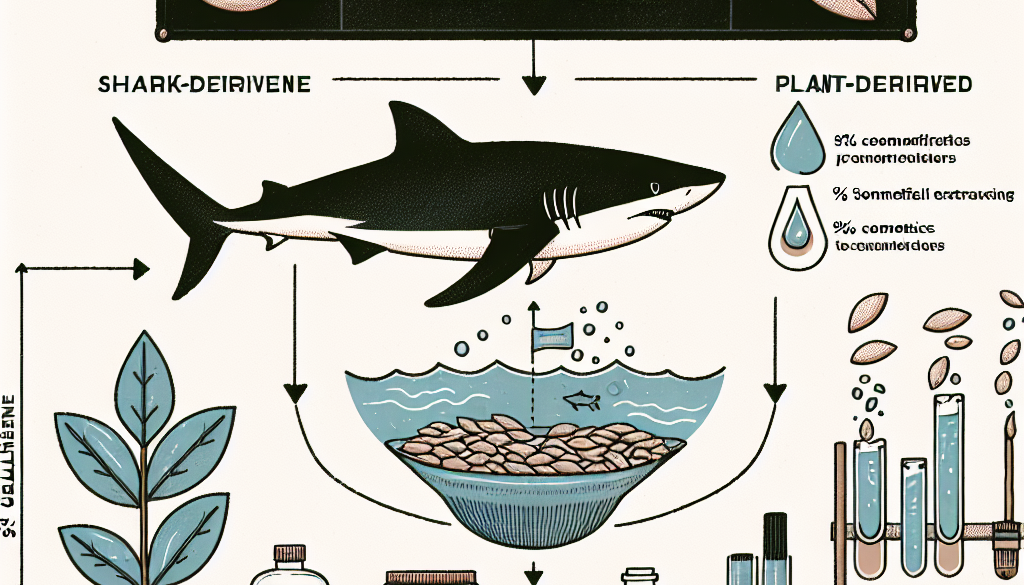Shark Squalene: Ethical Concerns
-
Table of Contents
- Shark Squalene: Ethical Concerns and Sustainable Alternatives
- The Significance of Squalene
- Shark Squalene: A Controversial Source
- Impact on Shark Populations and Marine Ecosystems
- Ethical Concerns and Consumer Awareness
- Plant-Based Alternatives to Shark Squalene
- Case Studies and Statistics
- Conclusion: Embracing Ethical Practices
- Discover Ethical Protein Alternatives with ETprotein
Shark Squalene: Ethical Concerns and Sustainable Alternatives

Shark squalene has been a controversial ingredient in various industries, particularly cosmetics and pharmaceuticals, due to its perceived benefits. However, the extraction of squalene from sharks raises significant ethical concerns, leading to a growing demand for sustainable and ethical alternatives. This article delves into the ethical issues surrounding shark squalene, the impact on shark populations, and the emergence of plant-based alternatives that offer a promising solution.
The Significance of Squalene
Squalene is a natural organic compound that is highly prized for its moisturizing properties and its ability to enhance the absorption of other ingredients. It is commonly found in skincare products, vaccines, and other pharmaceuticals. Squalene’s unique chemical structure makes it an effective emollient and antioxidant, which is why it has become a sought-after ingredient in various formulations.
Shark Squalene: A Controversial Source
Traditionally, squalene has been sourced from the liver oil of sharks, particularly deep-sea species like the gulper and basking sharks. These species are often targeted for their oil-rich livers, which can make up to a quarter of their body weight. The demand for shark squalene has led to overfishing and a decline in shark populations, raising serious ethical and environmental concerns.
Impact on Shark Populations and Marine Ecosystems
- Overfishing: The pursuit of squalene has contributed to the overfishing of sharks, with millions killed annually for their liver oil.
- Bycatch: Sharks are often caught as bycatch in fisheries targeting other species, exacerbating the decline in shark numbers.
- Threatened Species: Many shark species are now threatened with extinction, with squalene extraction being a contributing factor.
- Ecosystem Imbalance: As apex predators, sharks play a crucial role in maintaining the balance of marine ecosystems. Their decline can lead to trophic cascades and the disruption of oceanic food webs.
Ethical Concerns and Consumer Awareness
Consumers are becoming increasingly aware of the ethical implications of using shark-derived squalene. The cruelty involved in harvesting shark liver oil, coupled with the environmental impact of declining shark populations, has led to a call for more ethical and sustainable alternatives. This awareness has prompted some companies to pledge against the use of shark squalene and to seek plant-based sources instead.
Plant-Based Alternatives to Shark Squalene
Recognizing the ethical issues associated with shark squalene, the industry has turned to plant-based sources such as olive oil, amaranth seed, rice bran, and sugarcane. These alternatives not only provide the same benefits as shark squalene but also offer a sustainable and cruelty-free option. Advances in biotechnology have also enabled the production of squalene through fermentation processes, further reducing the need for animal-derived ingredients.
Case Studies and Statistics
Several case studies highlight the successful transition to plant-based squalene. For instance, a major cosmetics company replaced shark squalene with olive-derived squalene in its products, resulting in a positive consumer response and a decrease in the company’s environmental footprint. Statistics show that the demand for plant-based squalene is on the rise, with the market expected to grow significantly in the coming years as more companies adopt sustainable practices.
Conclusion: Embracing Ethical Practices
The ethical concerns surrounding shark squalene have sparked a necessary debate about the sources of our ingredients and the impact of our consumption habits on the environment. By choosing sustainable alternatives and supporting companies that prioritize ethical sourcing, consumers can play a vital role in protecting shark populations and marine ecosystems. The shift towards plant-based squalene is a positive step towards a more responsible and conscious industry.
Discover Ethical Protein Alternatives with ETprotein
If you’re looking for ethical and sustainable protein options, ETprotein offers a range of plant-based protein products that align with your values. Their organic vegan proteins, including rice, pea, and seed-based proteins, are non-GMO and allergen-free, ensuring you can enjoy high-quality nutrition without compromising on ethics. ETprotein’s commitment to sustainability and ethical sourcing makes them a trusted choice for consumers and businesses alike.
About ETprotein:
ETprotein, a reputable protein and L-(+)-Ergothioneine (EGT) Chinese factory manufacturer and supplier, is renowned for producing, stocking, exporting, and delivering the highest quality organic bulk vegan proteins and L-(+)-Ergothioneine. They include Organic rice protein, clear rice protein, pea protein, clear pea protein, watermelon seed protein, pumpkin seed protein, sunflower seed protein, mung bean protein, peanut protein, and L-(+)-Ergothioneine EGT Pharmaceutical grade, L-(+)-Ergothioneine EGT food grade, L-(+)-Ergothioneine EGT cosmetic grade, L-(+)-Ergothioneine EGT reference grade and L-(+)-Ergothioneine EGT standard. Their offerings, characterized by a neutral taste, non-GMO, allergen-free attributes, with L-(+)-Ergothioneine purity over 98%, 99%, cater to a diverse range of industries. They serve nutraceutical, pharmaceutical, cosmeceutical, veterinary, as well as food and beverage finished product distributors, traders, and manufacturers across Europe, USA, Canada, Australia, Thailand, Japan, Korea, Brazil, and Chile, among others.
ETprotein specialization includes exporting and delivering tailor-made protein powder and finished nutritional supplements. Their extensive product range covers sectors like Food and Beverage, Sports Nutrition, Weight Management, Dietary Supplements, Health and Wellness Products, and Infant Formula, ensuring comprehensive solutions to meet all your protein needs.
As a trusted company by leading global food and beverage brands and Fortune 500 companies, ETprotein reinforces China’s reputation in the global arena. For more information or to sample their products, please contact them and email sales(at)ETprotein.com today.














